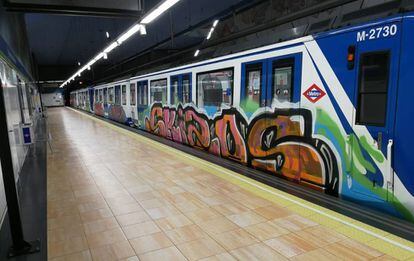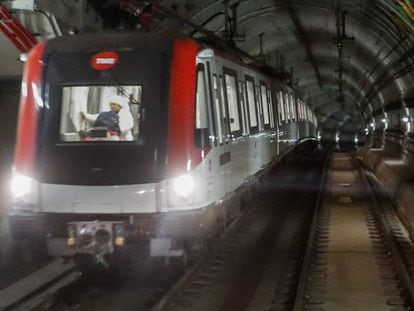Violent graffiti artists overrun subway stations in Madrid and Barcelona
Groups of young vandals orchestrated a series of attacks on trains over the long weekend, spraying paint in the faces of two police officers and a pregnant woman
It’s Sunday at 3.48am at the Margall station on Line 4 of Barcelona’s underground Metro system. Thirty-four people get off a train by pulling the emergency brake, and in a matter of seconds they begin to spray-paint one of the carriages. They are perfectly organized.
They use violence. This is not art. It is a crime.
TMB head of security and civil protection Ricardo Ortega
A pregnant woman and two more passengers confront the vandals. The graffiti artists respond violently, and one of them sprays the pregnant woman in the face. When security guards from Barcelona’s municipal transportation authority TMB arrive at the scene, the group escapes in minutes. They have caused more than €10,000 in damages to the train. Three passengers require medical attention. Only one of the vandals is detained and handed over to the regional police.
The problem of violent train vandals is not exclusive to Barcelona. During the All Saints’ long weekend, there were five attacks on subway trains in Madrid. In the early hours of Thursday morning on November 1, a group of graffiti artists forced a train conductor on Line 12 to move the train to a more visible area so they could do a “better” job with their graffiti. The driver had an anxiety attack.
Almost at the same time, a security guard noticed a group of individuals spray-painting the Casa de Campo station on Line 5. But when the guard tried to film the vandals they sprayed him in the face.

Last Friday, 15 young people pulled the emergency brake on a train as it was arriving at Marqués de Vadillo station on Line 5. In a matter of minutes, they had spray-painted five carriages.
That same night at 9.45pm, there was another attack on the Las Rosas station on Line 2 when around 50 individuals spray-painted 700 meters across train cars situated at the end of the line. The security guards called the National Police, who tried to round up the culprits. Seeing they were trapped, the vandals sprayed paint in the face of two officers, who required medical attention. Only one man, a 20-year-old of Pakistani origin, was arrested. The rest managed to escape, while the police seized more than 250 spray paint cans.
The fifth attack occurred in the early hours of Sunday morning at Hospital del Henares station on Line 7, when vandals painted 18 meters across one of the trains.
More violent
“Before this, when a graffiti artist was caught in the act, he’d run away. Now they come prepared with steel bars and they respond with violence,” says Ricardo Ortega, the head of security and civil protection at TMB. Ortega says that now is the time to look for a solution and not “to waste time with fruitless debates about whether what these individuals do is art or not.” In 2017, there were 531 acts of vandalism in Barcelona’s Metro network. Since the beginning of 2018, that figure is already 465.
Since 2018, there have been 465 acts of vandalism on Metro trains in Barcelona
“Every day, there are lots of attempts that we are able to stop and that end in broken doors, holes in walls, problems with security systems … actions that are not reflected by the statistics,” says Ortega. “The graffiti artists put their ego above everything else, and they don’t mind putting their lives and the lives of others at risk. They use violence. This is not art. It is a crime.”
“In fact, we have seen some rulings that punish those who cause damage and even ban them from using public transportation for months, as is already being done with pickpockets,” he warns.
Ortega says that it is difficult to quantify the damage caused by the vandals, but according to the Observatory of Civility in Rail Transportation in Spain, train operators across the country shelled out €63 million between 2015 and 2016 to pay for repairs.
“The current inertia makes us uncomfortable. These are people whose actions are well rehearsed. The worst is when one of our employees or another passenger crosses paths with these groups. They either stay quiet or get in trouble. We have to put a stop to this.”
English version by Melissa Kitson.













































